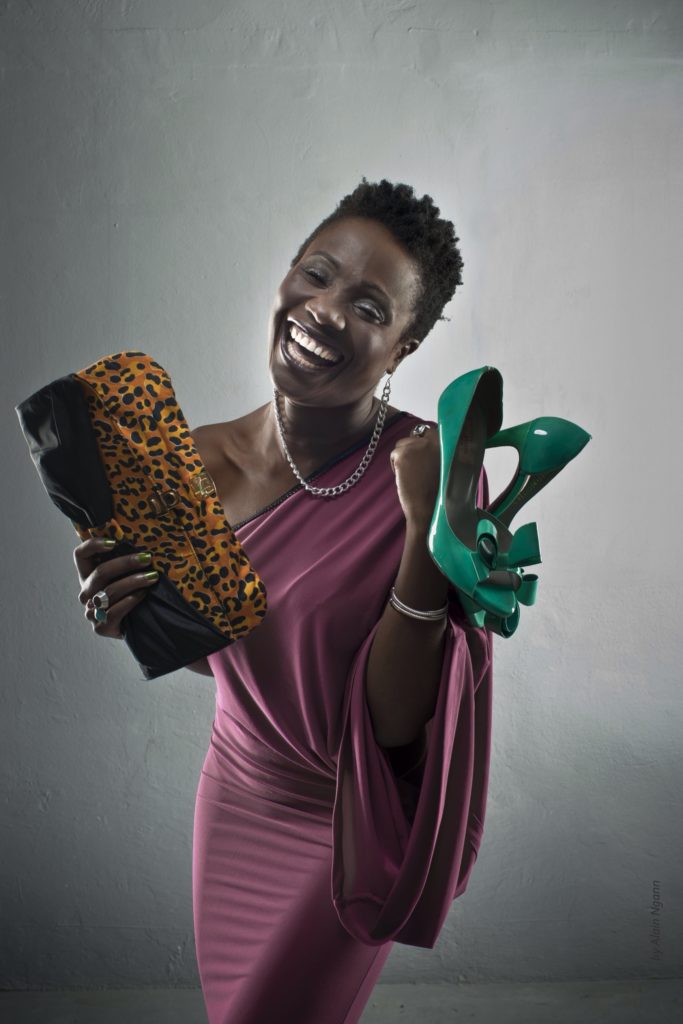How did your journey into fashion begin?
I never was one of those kids who grew up dreaming of becoming a fashion designer. Those would be fancy dreams for a kid in Cameroon. However, I always had deep interests in fashion but it came to a point where I wanted to be more active in the fashion scene. When I moved to the United States and started struggling with identifying myself, my first refuge was to be able to do so through fashion.
In the summer of 2009, I traveled to Cameroon and came up with method of modernizing the traditional regalia of my home town. This led to me creating a little black dress with the toghu embroidery over it. The toghu is an intricate and colorful embroidery done on garments worn by the royalty and on special occasions by the Tikar and Bamileke people of the Northwest and Western regions of Cameroon. This dress became a hit when I wore it and several people asked me about it. They then asked me to make it for them. Before long, I had done a handful of pieces which I loved and eventually decided to transport my creativity into a more formal venture.
What are some of your career highlights?
Being nominated under the category Emerging Designer of the Year 2013 by Africa Fashion International Awards was really an amazing moment for me. I felt like I am doing something right and it is being recognized. Also, I had Precious Moloi-Motsepe wear my dress in 2012 and she totally loved it.


What’s the philosophy behind the
KibonenNY brand?
I am very passionate about soft transportation of culture as well as ethical fashion. To me, modernizing the traditional Cameroonian toghu in its finest form so that it appeals to a wide range of consumers is key. Staying true to my dream of creating jobs for the people in Cameroon is very important to me hence KibonenNY is an ethical fashion brand. Cameroon is a country with abundant talent, unbelievable design aesthetics, amazing and beautiful people, yet over 49% of the population live below the poverty line. This urged the formation of my brand, using the business of fashion to help create employment in Cameroon.
Where do you draw inspiration for your collections?
Different events in life and natural happenings help me get inspiration as well as visiting different parts of the world. When I am in a new place, the first thing I start doing is thinking of what aspects of their culture I can get and add to my work.
What can be done to improve the local fashion industry?
The fashion industry needs schools. Young people have to be trained in these fields. I should have studied fashion in college but we do not have those facilities in Cameroon. Today, after a few years in fashion, I decided to go back to the Art Institute of New York City to get a deeper knowledge of how the industry really works. You can start fashion as a hobby but when money has to be really made it has to be done right. Right now, my team and I started a non-profit Cameroon Fashion Association of America which is helping with a couple of projects to develop fashion in Cameroon.

Having lived in New York, how
different are the industries compared to your home country?
I do not think we have a fashion industry in Cameroon. It is still at its early growth stage. However, the industry in South Africa has really grown, the very high standards provide a conducive environment for the designers to grow. In New York, where I live, the competition is very intense. The gap between emerging designers and established designers is too great. However it forces you to raise your bar and work really hard, which I love.
What can we expect from KibonenNY in the year ahead?
Loads of great things and I am excited. We are finalizing negotiations with some stores in South Africa who will be carrying our brand in 2014. Also we are looking at getting financing and more staff on board.
